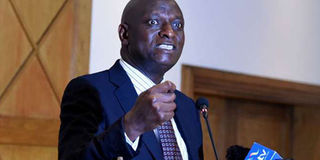Add ‘clean’ to cheap power presidential order

Energy Cabinet Secretary Charles Keter speaks during a function at Intercontinental Hotel, Nairobi, on August 15, 2018. Energy may as well become our top foreign exchange earner and make our manufactured goods cheaper. PHOTO | FILE | NATION MEDIA GROUP
What you need to know:
- It behoves the President to take on the cartels in the energy sector that benefit from unfairly high electricity charges.
- Cleaner and greener energy sources can cover projected deficits of energy more cheaply.
President Uhuru Kenyatta’s directive to Energy Cabinet Secretary Charles Keter this week to lower electricity prices is an early Christmas present to Kenyans.
And it is fitting that the order was made from Strathmore Business School, a leader in energy conservation, more so solar power, during the small- and medium-sized enterprises (SMEs) presidential roundtable.
I have mentioned before that energy will be a key ingredient to power President Kenyatta’s ‘Big Four’ legacy projects — particularly manufacturing and, in effect, job creation.
It behoves the President to take on the cartels in the energy sector that benefit from unfairly high electricity charges. That may include a rethink on the Lamu coal power project.
COAL
On September 19 in San Francisco, United States, a unique protest happened: Against US energy giant General Electric’s involvement in the Lamu coal power plant.
Now, “Frisco” is the tech capital of the world, home to the largest technology companies and, arguably, the engine of America.
One paradox is, why would such a forward-thinking company as GE get involved in a dinosaur-era fuel like coal? The US state’s ‘tech capital’ image was thrown into doubt.
The butterfly effect of the protest has reportedly made GE to reconsider the investment. GE was to buy a stake in the plant and provide turbines to run it.
The company explained that the deal would not be in line with its stated support of the 2015 Paris Agreement on climate change.
Even though US President Donald Trump signed an executive order pulling the country out of the Paris Agreement, non-State actors are still committed to it.
Another paradox: Why are the Chinese, who are decommissioning coal power plants in their hundreds for their adverse effects on the environment, exporting the second-hand plants to Africa?
Government mandarins will choke us with such bywords as development, but at what cost?
CHEAP
Scientists aver that the coal station would not even provide affordable power. Cleaner and greener energy sources can cover projected deficits of energy more cheaply.
Sometimes one wonders why Kenya ratifies international agreements, even domesticates them, and then dumps them on the shelves.
For instance, the feed-in tariff (FiT) energy task force formed by President Kenyatta came up with raft of recommendations, key among them, an energy auction system. Pray, why are they not implemented?
With the muteness from government, we can only deduce that its agencies are hell-bent on selling expensive power to Kenyans since renewable energy projects don’t provide huge paybacks and rent-seeking opportunities like such fossilised ideas as coal plants.
BILLS
Many investors in clean energy will tell you the investment climate for renewables faces so much formidable headwinds that most are forced to opt out.
But is not all doom and gloom. To the credit of Kenya Power, a model of FiT, albeit medium-scale, is being implemented by Strathmore University.
At Sh12.36 per kilowatt hour supplied, the institution has not only nearly eliminated its power bills of about 25 million annually but, as per its 20-year power purchase agreement (PPA), supplies 0.25MW to the grid, making Sh25,000 sales per day.
With our abundant wind and solar resources, energy may as well become our top foreign exchange earner and make our manufactured goods cheaper.
Ms Hassan is the Kisumu branch manager for Solarnow. [email protected]





